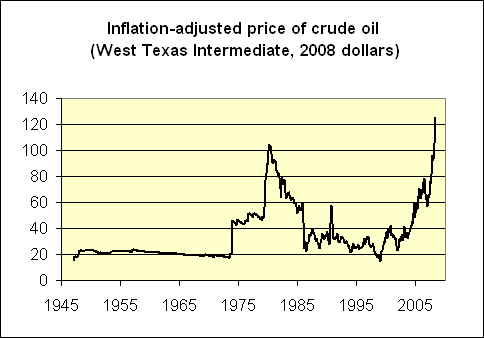James Hamilton on the 2008 Oil Shock
Prof. Hamilton has an interesting post that argues that we are now seeing another oil shock like we say in 1973-74 (oil embargo), 1978 (Iranian Revolution), 1980 (Iran-Iraq war), and 1990 (first Persian Gulf war). Prof. Hamilton notes that in all cases the run up in oil prices was followed by a recession. Now, using recent data we see that we are again facing a very similar run up in oil prices.

However, when oil prices started to rise again five years ago, many of us suggested that things would be different this time, in part because the price was rising much more gradually and so should be less disruptive of consumer spending patterns. Others emphasized that, despite the price increases, oil was still cheaper than it had been historically if you took into account inflation. However, once you include the most recent data, neither of those claims would still be true.
Another reason consumers had been largely shrugging off the oil price increases of the last few years is that they could afford to do so, since energy expenditures had fallen so significantly as a fraction of total income. However, as a result of rising oil prices, that, too, is no longer the case.
Prof. Hamilton compiles additional evidence that the price of oil is possibly coming to a turning point. The dollar value of U.S. crude oil consumed as a fraction of GDP, the number of vehicle miles traveled, the consumption of gasoline, and the sales of SUV. All of these time series point in the same direction: consumers are reacting to the run in the price of oil, and in a way that could be lead to a recession. He also notes that Continental, Delta, United and American Airlines are all cutting jobs in response to higher oil prices. Factor in the problems in the real estate/housing market and it doesn’t bode well for the economy.
Speculation is the leading cause in the raise in the price of oil. Not any market factor. This is a bubble, just like the housing market. That balloon will soon burst as people stop recreation use of their vehicles and fuel use goes down. Those who have futures investments will lose a fortune. Government needs oversight on the futures market. Where is George Soros’ money in all of this?
My understanding is the Mr. Soros is primarily a currency trader rather than a commodities trader. I suspect he’s taking a short position on the dollar.
Uncertainty about the future is good for currency traders.
Finally, something I agree with ZR on. This price spike is caused by speculators fleeing the mortgage, bank and capital markets and chasing commodities as the hot investment of the moment. But I don’t see consumption going down in the near term enough to pop the bubble. The government does have to have greater scrutiny over the futures markets and close the loophole for allowing banks and investment firms to engage in large commodities trades.
A single announcement by an oil analyst in New York led to Friday’s panicked buying. If this is not time for regulators to step in I don’t know what a good time would be. With lightning fast trades, low margins, a weak dollar, and excess funds fleeing to oil it will take something substantial to stop this cycle.
Consumption is down, production is up. Market fundamentals point to lowering prices but irrational forces are pushing prices higher.
Those worried about our economic future should blame oil first and foremost. Those who can do something about it need to get their ass in gear.
? Could you provide support for this assertion? My understanding is that global consumption is up and global production is flat.
That’s historically been a cause for concern, or at the very least a good enough reason to re-evaluate your position on the subject.